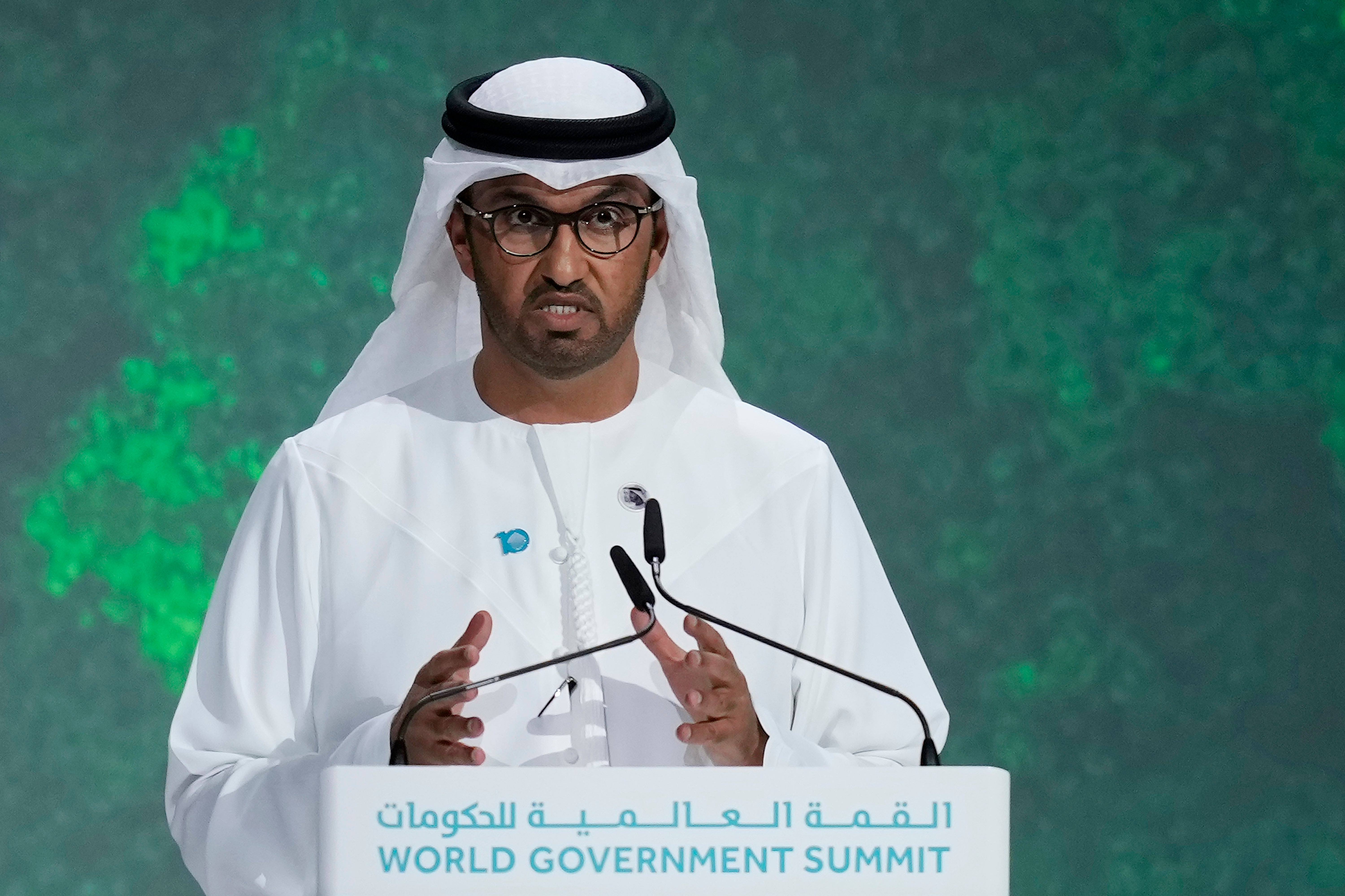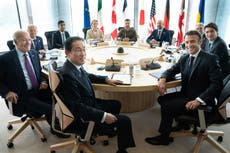US and EU lawmakers call for UAE oil boss to be removed as UN climate summit chief
Expert, however, says the US and EU cannot intervene in the decision to elect Cop28 president

Your support helps us to tell the story
From reproductive rights to climate change to Big Tech, The Independent is on the ground when the story is developing. Whether it's investigating the financials of Elon Musk's pro-Trump PAC or producing our latest documentary, 'The A Word', which shines a light on the American women fighting for reproductive rights, we know how important it is to parse out the facts from the messaging.
At such a critical moment in US history, we need reporters on the ground. Your donation allows us to keep sending journalists to speak to both sides of the story.
The Independent is trusted by Americans across the entire political spectrum. And unlike many other quality news outlets, we choose not to lock Americans out of our reporting and analysis with paywalls. We believe quality journalism should be available to everyone, paid for by those who can afford it.
Your support makes all the difference.Over 130 members of Congress and the European Parliament have called for the removal of Sultan Al Jaber, the oil executive leading this year’s climate talks in the UAE.
Climate experts have been riled up ever since the UAE controversially announced the appointment of Mr Al Jaber, the group CEO of Abu Dhabi National Oil Company (Adnoc), as the president of Cop28, which will be held in Dubai in November.
An open letter issued by the lawmakers on Tuesday urged Joe Biden, European Commission president Ursula von der Leyen and UN secretary-general António Guterres to engage in diplomatic efforts for Mr Al Jaber’s withdrawal.
Climate activists and experts have called out the conflict of interest posed by the appointment and argued that it undermines the integrity of the conference.
The outrage has now taken a diplomatic turn because of the weighing in of the US and EU lawmakers – who are from two of the world’s three biggest polluters.
“The decision to name as president of Cop28 the chief executive of one of the world’s largest oil and gas companies – a company that has recently announced plans to add 7.6 billion barrels of oil to its production in the coming years, representing the fifth largest increase in the world – risks undermining the negotiations,” the lawmakers wrote in the joint letter.
They said the talks stand the risk of getting “severely jeopardised by having an oil company executive at the helm”.
Democrat representative Ro Khanna, who is among the signatories of the letter, told the Washington Post that Mr Al Jaber’s appointment is a “slap in the face to young climate activists”.
“The head of a national oil company should not be the president-designate of a climate conference,” he said.
Mr Al-Jaber’s office has responded to the letter by pointing to his experience attending 11 past UN climate conferences, his pledge to shift Adnoc’s business away from fossil fuels and his role in founding Masdar, the Abu Dhabi-based global renewables giant.
“We believe that Dr Sultan’s experience as an engineer, working across the energy spectrum, coupled with his experience as a senior global industry leader, are assets that will help drive the UAE’s transformative approach to Cop28,” it said.
Some have argued that providing fossil fuel industrialists a seat at the table in climate negotiations is essential for a faster transition to renewables as they are the biggest polluters.
Activists, however, say it risks stalling progress as industries continue to prioritise their economic gains.
“We can’t trust oil companies who have such a bad track record of causing the delay and looking at their profits and not people and the planet,” Harjeet Singh, head of global political strategy at Climate Action Network (CAN) told The Independent.
But the move by lawmakers to address the US president and EU chief in the letter, urging them to intervene on a matter that was UAE’s decision as a host also raises questions.
The letter does not address the G77, the bloc of developing countries that the UAE is part of, along with other large emitters like China and India.
Mr Singh said the US lawmakers are “barking up the wrong tree” by asking the US and the EU to intervene in a process that does not involve them.
“It’s not their matter, the process [of electing the Cop28 chief] has happened and it’s a G77 matter,” he said. “They can’t act like big brothers to remove any Cop president, they have no business there.”
“What we should question now is why they [US and EU] welcomed the decision and did not criticise it when civil society was criticising,” he adds.
Chief climate negotiators from the US and EU had earlier backed Mr Al Jaber’s appointment, saying that his presence would help convince oil companies to transition to renewables.
EU climate chief Frans Timmermans defended the UAE’s decision, asking people to “look at his [Al Jaber’s] impressive track record”, pointing to his role in founding Masdar, the Abu Dhabi-based global renewables giant.
He said Mr Al Jaber as the Cop28 chief can “help convince other executives in oil and gas to finally start investing in the transition towards renewable energy”.
“We have some really tough cookies in that sector that we need to address, but I want them on board – I don’t want them vilified,” he said.
John Kerry, the US’s chief climate negotiator called Mr Al Jaber a “terrific choice” because his “company knows it needs to transition”.
Concerns were also raised by the UN over how the Cop28 presidency was keeping the oil business of Mr Jaber separate from this year’s climate negotiations.
According to a report by Politico, the presidency was temporarily conducting its work from two floors of an 11-storey building located next to the Adnoc office.
Also read: UN forced to ask whether Cop28 climate summit is effectively being run by an oil company
The controversy surrounding the Cop28 leadership extends beyond Mr Al Jaber’s appointment. The letter calls on the UAE to require companies to disclose their climate-related lobbying and campaign contributions before participating in the conference. The call for greater transparency and accountability in climate negotiations has been a long-standing demand by climate activists.
Questions were also raised on the participation of fossil fuel officials at last year’s Cop27 summit in Egypt, which saw the presence of more than 600 oil and gas lobbyists, the largest so far. This was more the combined representation of the eight countries that have suffered the greatest climate impacts since 2000.
Moreover, the UAE’s invitation of Syrian president Bashar al-Assad to the climate talks has also drawn additional condemnation from human rights activists.
While it is within UAE’s rights to extend invitations, critics argue that this move normalises relations with a regime accused of severe human rights abuses, including the use of chemical weapons.
The Cop28 office said the event marked “a milestone opportunity for the world to come together, course correct, and drive progress towards keeping the goals and ambitions of the Paris Climate Agreement alive”.



Join our commenting forum
Join thought-provoking conversations, follow other Independent readers and see their replies
Comments